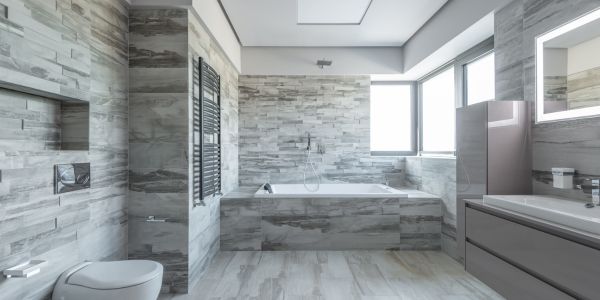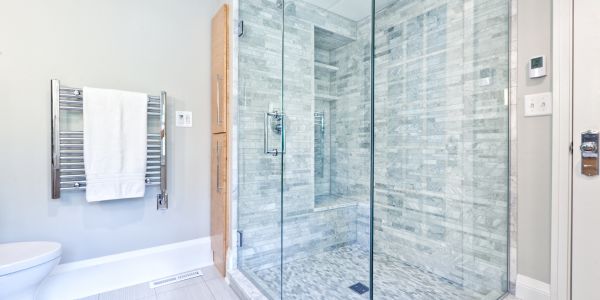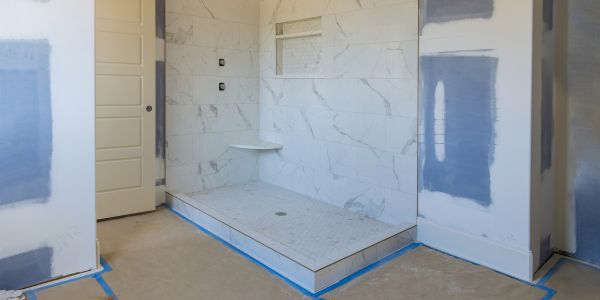When it comes to designing a bathroom, one of the primary considerations is the choice of tiles. Among the various options available, ceramic tiles stand out as a popular and versatile choice. In this exploration, we delve into the world of bathroom tiles, focusing on ceramic tiles, to understand their properties, benefits, and why they remain a preferred option for many homeowners and designers. So, let’s embark on a journey to discover whether bathroom tiles are indeed ceramic and why they might be the ideal choice for your next bathroom project.
Is ceramic tile good for bathroom?

Yes, ceramic tile is a good choice for bathrooms due to its water resistance, durability, ease of maintenance, and wide range of design options. It’s a practical and versatile option for bathroom floors, walls, and shower areas. However, the suitability of ceramic tile depends on your specific needs and design preferences, so it’s essential to consider your unique requirements when making a decision.
Are bathroom tiles ceramic: Explained
Yes, bathroom tiles are often ceramic, but not exclusively so. Ceramic tiles are a popular choice for bathrooms due to their numerous advantages. Here’s an explanation of why bathroom tiles are often ceramic:

Ceramic Tiles in Bathrooms:
- Water Resistance: Ceramic tiles are inherently water-resistant, making them a suitable choice for bathroom applications. They can withstand moisture, splashes, and humid conditions, which are common in bathrooms.
- Durability: Ceramic tiles are known for their durability and long lifespan. They can withstand heavy foot traffic and are resistant to stains, scratches, and wear over time.
- Versatility: Ceramic tiles come in a wide variety of colors, patterns, and styles. This versatility allows homeowners and designers to achieve various aesthetics, from classic to contemporary, in bathroom design.
- Ease of Maintenance: Cleaning and maintaining ceramic tiles is relatively simple. Regular cleaning with mild detergents and occasional sealing (for some types) helps keep them looking fresh and new.
- Cost-Effective: Ceramic tiles are often cost-effective compared to other tile materials like porcelain or natural stone. This affordability makes them a practical choice for bathroom renovations.
- Hygienic: Ceramic tiles are non-porous, which means they don’t harbor bacteria or allergens, contributing to a hygienic bathroom environment.
However, it’s essential to note that while ceramic tiles are a popular choice, there are other options available for bathroom tiles, including porcelain, natural stone (such as marble or granite), glass, and even luxury vinyl tiles (LVT). The choice depends on your design preferences, budget, and the specific requirements of your bathroom project.
In summary, ceramic tiles are a common and practical choice for bathroom surfaces due to their water resistance, durability, versatility, ease of maintenance, and affordability. Still, it’s essential to consider your specific needs and design vision when selecting the right tiles for your bathroom.
Are all bathroom tiles ceramic?

No, not all bathroom tiles are ceramic. While ceramic tiles are a popular choice for bathroom surfaces due to their water-resistant properties, durability, and versatility, there are various types of tiles used in bathrooms, each with its unique characteristics. Some of the common types of bathroom tiles include:
- Ceramic Tiles: As mentioned, ceramic tiles are a prevalent choice. They are made from clay and other natural materials and are known for their durability and wide range of design options.
- Porcelain Tiles: Porcelain tiles are also a popular choice for bathrooms. They are a type of ceramic tile but are denser and less porous, making them even more water-resistant and suitable for high-moisture areas.
- Natural Stone Tiles: Natural stone tiles like marble, granite, slate, and travertine are used for a luxurious and elegant look in bathrooms. These tiles can vary in terms of water resistance, so proper sealing may be necessary.
- Glass Tiles: Glass tiles are another option, often used for decorative accents in bathroom design. They can add a unique and reflective quality to the space.
- Luxury Vinyl Tiles (LVT): LVT is a synthetic option that replicates the look of natural materials like wood or stone. It’s a water-resistant and cost-effective choice for bathroom floors.
- Mosaic Tiles: Mosaic tiles, whether made from ceramic, glass, or natural stone, are small, decorative tiles that can be used to create intricate patterns and designs in bathrooms.
- Terracotta Tiles: Terracotta tiles offer a warm and rustic look and are suitable for bathrooms when properly sealed.
The choice of bathroom tiles depends on factors such as your design preferences, budget, and the specific requirements of your bathroom project. It’s essential to consider the level of water resistance, durability, and maintenance needs when selecting the right type of tiles for your bathroom.
Which tile is best for bathroom?

The best type of tile for a bathroom depends on various factors, including your design preferences, budget, and the specific requirements of your bathroom. Here are some popular options, each with its own advantages:
- Ceramic Tiles: Ceramic tiles are a practical choice for most bathrooms. They are durable, water-resistant, and come in a wide range of styles and colors. They are also budget-friendly, making them a versatile option.
- Porcelain Tiles: Porcelain tiles are a type of ceramic tile that is denser and less porous, making them highly water-resistant. They are ideal for bathrooms with high moisture levels and heavy foot traffic.
- Natural Stone Tiles: Natural stone tiles like marble, granite, and travertine offer a luxurious and timeless look. They can add elegance to your bathroom, but they may require more maintenance and sealing to prevent water damage.
- Glass Tiles: Glass tiles are often used as decorative accents in bathroom design. They can create stunning visual effects and add a reflective quality to the space.
- Mosaic Tiles: Mosaic tiles, which can be made from ceramic, glass, or natural stone, are great for creating intricate patterns and designs in your bathroom. They are often used for backsplashes and shower walls.
- Luxury Vinyl Tiles (LVT): LVT is a synthetic option that replicates the look of natural materials like wood or stone. It’s water-resistant, budget-friendly, and easy to maintain.
- Terracotta Tiles: Terracotta tiles offer a warm and rustic appearance. They are suitable for bathrooms when properly sealed, but they may require more maintenance than some other options.
To determine the best tile for your bathroom, consider the following:
- Moisture Resistance: Bathrooms have high humidity levels, so choose tiles that are water-resistant or waterproof for areas like shower walls and floors.
- Durability: Consider the tile’s durability, especially if your bathroom gets a lot of foot traffic.
- Maintenance: Some tiles require more maintenance than others, such as sealing natural stone tiles periodically.
- Design Preferences: Your design style and color preferences will also influence your choice of tile.
- Budget: Set a budget for your project and choose tiles that fit within it.
Ultimately, the best tile for your bathroom should combine functionality, aesthetics, and your personal preferences to create a space that meets your needs and looks appealing.
FAQ’s
Certainly, here are some frequently asked questions (FAQs) about bathroom tiles, specifically addressing whether bathroom tiles are ceramic:
Are all bathroom tiles made of ceramic?
- A1: No, not all bathroom tiles are ceramic. While ceramic tiles are common, there are various tile materials used in bathrooms, including porcelain, natural stone, glass, and more.
What are ceramic tiles made of?
- A2: Ceramic tiles are primarily made from clay and other natural materials. They are then fired at high temperatures to create durable and water-resistant tiles.
Are ceramic tiles suitable for bathroom floors?
- A3: Yes, ceramic tiles are a popular choice for bathroom floors due to their water resistance, durability, and versatility in design.
Can I use ceramic tiles in shower areas?
- A4: Yes, ceramic tiles are suitable for shower walls and even shower floors. However, it’s essential to choose slip-resistant varieties for safety.
Are ceramic tiles easy to clean in a bathroom?
- A5: Yes, ceramic tiles are generally easy to clean with regular maintenance. They are resistant to stains and moisture, making them a practical choice for bathrooms.
Do ceramic tiles come in various styles and colors?
- A6: Yes, ceramic tiles offer a wide range of design options, including different styles, colors, and patterns, allowing for customization to match your bathroom’s aesthetics.
How do ceramic tiles compare to porcelain tiles for bathroom use?
- A7: Both ceramic and porcelain tiles are suitable for bathrooms. Porcelain tiles are denser and less porous, making them even more water-resistant, but ceramic tiles offer more design variety.
Are there alternatives to ceramic tiles for bathroom walls and floors?
- A8: Yes, alternatives include natural stone tiles (like marble or granite), glass tiles, mosaic tiles, luxury vinyl tiles (LVT), and terracotta tiles, each with its unique characteristics.
Do ceramic tiles require sealing in a bathroom?
- A9: Glazed ceramic tiles do not typically require sealing because the glaze acts as a protective barrier. However, unglazed ceramic tiles may benefit from sealing to enhance their stain resistance.
Can I install ceramic tiles in a DIY bathroom project?
- A10: Yes, ceramic tile installation is often suitable for DIY enthusiasts. However, for more complex projects, it’s advisable to consult with a professional or seek guidance from tile experts.
Remember that while ceramic tiles are a common choice, there are other options available for bathroom tiles, so it’s essential to consider your specific needs and preferences when making your selection.
Conclusion
In conclusion, the question of whether bathroom tiles are ceramic reveals a fascinating world of tile choices, each with its unique set of characteristics and advantages. While ceramic tiles remain a prevalent option due to their durability, water resistance, and design versatility, it’s important to recognize that bathrooms offer a diverse canvas for tile materials.
From luxurious natural stones like marble and granite to the reflective elegance of glass tiles, and the rustic charm of terracotta, there’s a tile for every taste and style preference. The decision ultimately hinges on your specific requirements, design aspirations, and budget considerations.
What’s clear is that the world of bathroom tiles extends far beyond ceramics, offering a spectrum of choices that allow you to create a bathroom space that is not only functional but also aesthetically pleasing and uniquely tailored to your vision. So, whether you choose ceramic or explore the myriad alternatives, your bathroom can be a canvas for creativity and functionality, transforming it into a sanctuary that reflects your personal style and meets your practical needs.